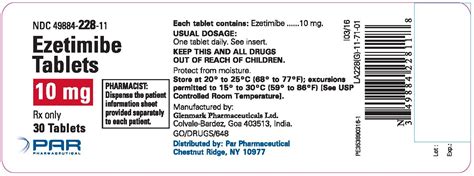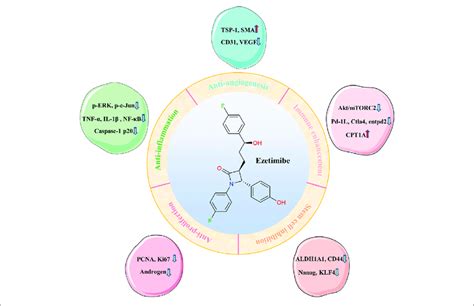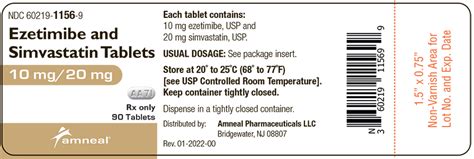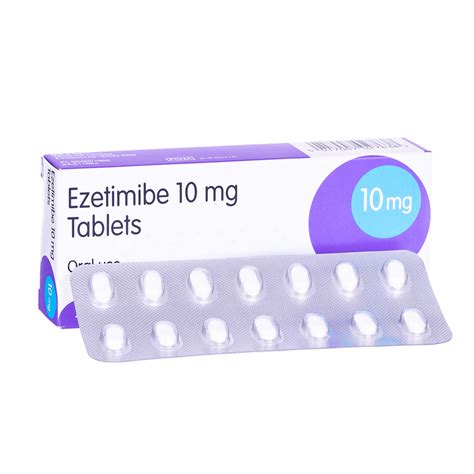Intro
Learn about Ezetimibe 10mg Tablet, a cholesterol absorption inhibitor, used to lower LDL and total cholesterol, with benefits for cardiovascular health, reducing heart disease risk, and managing hyperlipidemia.
Ezetimibe, a medication widely used to treat high cholesterol, has become a staple in the management of cardiovascular health. As a key component in the arsenal against heart disease, understanding how ezetimibe works, its benefits, and how to use it effectively is crucial for both healthcare professionals and patients alike. The ezetimibe 10mg tablet, in particular, has been a subject of interest due to its efficacy in lowering cholesterol levels, thereby reducing the risk of cardiovascular events.
The importance of managing cholesterol levels cannot be overstated. High cholesterol, or hypercholesterolemia, is a significant risk factor for heart disease, which remains one of the leading causes of death worldwide. The condition can lead to the buildup of plaque in the arteries, known as atherosclerosis, which can result in heart attacks, strokes, and other cardiovascular diseases. Therefore, medications like ezetimibe play a critical role in preventing these outcomes by helping to control cholesterol levels.
Ezetimibe's mechanism of action is unique compared to other cholesterol-lowering drugs. It works by inhibiting the absorption of cholesterol in the small intestine, which is a key site for dietary cholesterol absorption. By reducing the amount of cholesterol absorbed from the gut, ezetimibe decreases the amount of cholesterol available to be transported to the liver, where it is either stored, used, or distributed to other parts of the body. This reduction in cholesterol absorption leads to lower levels of low-density lipoprotein (LDL) cholesterol, often referred to as "bad" cholesterol, in the blood.
Ezetimibe Mechanism of Action

Benefits of Ezetimibe
The benefits of ezetimibe are multifaceted, offering patients a potent tool in the management of high cholesterol. Some of the key advantages include: - **Effective Cholesterol Reduction**: Ezetimibe has been shown to significantly reduce LDL cholesterol levels when used alone or in combination with statins. - **Cardiovascular Risk Reduction**: By lowering LDL cholesterol, ezetimibe helps reduce the risk of major cardiovascular events, such as heart attacks and strokes. - **Complementary Therapy**: Ezetimibe can be used in conjunction with other lipid-lowering therapies, including statins, to achieve greater reductions in cholesterol levels. - **Intestinal Selectivity**: Its mechanism of action, which is localized to the intestine, reduces the risk of systemic side effects compared to some other cholesterol-lowering medications.Ezetimibe Dosage and Administration

Side Effects and Precautions
While generally well-tolerated, ezetimibe can cause side effects, although these are typically mild and transient. Common side effects include: - Headache - Dizziness - Fatigue - Diarrhea - Abdominal pain It is essential for patients to report any side effects to their healthcare provider, especially if they are severe or persistent.Ezetimibe Interactions

Monitoring and Follow-Up
Regular monitoring of lipid profiles and liver enzymes is recommended for patients on ezetimibe. This allows healthcare providers to assess the efficacy of the treatment and detect any potential adverse effects early on. Additionally, lifestyle modifications, including a healthy diet and regular physical activity, are crucial components of cholesterol management and should be encouraged in conjunction with ezetimibe therapy.Ezetimibe in Combination Therapy

Real-World Evidence and Outcomes
Real-world studies and clinical trials have provided valuable insights into the effectiveness and safety of ezetimibe in diverse patient populations. The IMPROVE-IT trial, a landmark study, demonstrated that the addition of ezetimibe to simvastatin therapy in patients with acute coronary syndromes resulted in a significant reduction in cardiovascular events. Such evidence supports the use of ezetimibe as an adjunct to statin therapy in patients at high risk of cardiovascular events.Future Directions and Research

Conclusion and Recommendations
In conclusion, ezetimibe 10mg tablets offer a valuable treatment option for managing high cholesterol and reducing cardiovascular risk. By understanding its mechanism of action, benefits, potential side effects, and role in combination therapy, healthcare providers can make informed decisions about its use. Patients should be encouraged to adhere to their prescribed regimen and adopt healthy lifestyle habits to maximize the benefits of ezetimibe therapy.To further engage with the topic, we invite readers to share their experiences or ask questions about ezetimibe and cholesterol management in the comments section below. Additionally, please consider sharing this article with others who may benefit from this information, and follow our page for more updates on health and wellness.
What is the primary mechanism of action of ezetimibe?
+Ezetimibe works by inhibiting the absorption of cholesterol in the small intestine.
Can ezetimibe be used in combination with other cholesterol-lowering medications?
+Yes, ezetimibe is often used in combination with statins and other therapies to achieve greater reductions in LDL cholesterol.
What are the common side effects of ezetimibe?
+Common side effects include headache, dizziness, fatigue, diarrhea, and abdominal pain.
